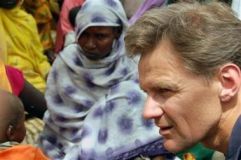China must do more on Darfur – UN adviser
May 22, 2007 (NEW YORK) — China must do more to stop the Darfur conflict in Sudan, said former U.N. aid chief Jan Egeland, while the United States should focus on trying to build peace between the Palestinians and Israel.
 Egeland, now a special adviser to U.N. Secretary-General Ban Ki-moon, also said he spent too much time in Washington instead of Beijing as he tried to draw attention to Darfur while he was U.N. emergency relief coordinator.
Egeland, now a special adviser to U.N. Secretary-General Ban Ki-moon, also said he spent too much time in Washington instead of Beijing as he tried to draw attention to Darfur while he was U.N. emergency relief coordinator.
“Darfur — I don’t think the United States can unlock. In the Palestinian conflict I think they can,” he told the Council on Foreign Relations in New York on Tuesday.
“The U.S. and the U.K. did all the right things on Darfur and it had little effect,” he said. “We should have had a wider coalition in the beginning and I blame myself for not going to Beijing more and less to Congress.”
He said public campaigns for action should have earlier targeted countries who invest in Darfur, like China and India, to push them to pressure Sudan to resolve the four-year-old conflict in Darfur.
“We have to ask what should China do? What should India do? What should the new superpowers do? Because in Africa they are the most active players,” he said, describing it as a “mistake” not to have targeted those countries earlier.
The U.N. Security Council last year adopted a resolution to deploy a “hybrid” U.N.-African Union force of more than 20,000. But Sudanese President Omar Hassan al-Bashir has only agreed to the deployment of 3,000 U.N. police and military personnel to aid the African Union force of about 7,000.
At least 200,000 people have been killed and more than 2.3 million made homeless in the Darfur conflict among African rebel groups, the Arab-dominated government and militia who back them. The United States calls it a genocide.
Egeland said when China began to pressure the Sudanese government in 2006, it was too late, saying: “It is much more difficult to roll back a tremendous war rather than stop it from brewing.”
He also said the Group of Eight — the United States, Britain, Canada, France, Germany, Italy, Japan and Russia — were failing in a promise to boost aid to poor countries. The G8 pledged in 2005 to double aid by 2010.
Organization for Economic Cooperation and Development data last month showed aid to poor nations actually fell to $103.9 billion in 2006 from $106 billion in 2005.
“It didn’t come through and now we have to hold them accountable,” Egeland said.
(Reuters)
